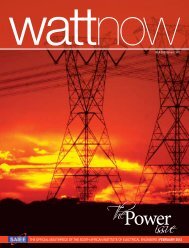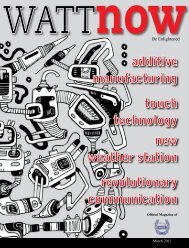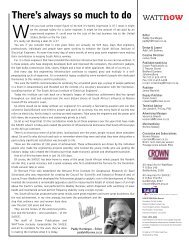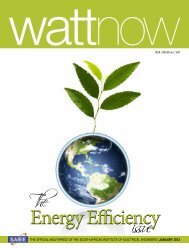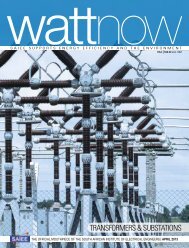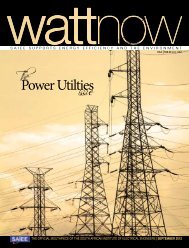Cut electricity consumption with automation - Watt Now Magazine
Cut electricity consumption with automation - Watt Now Magazine
Cut electricity consumption with automation - Watt Now Magazine
You also want an ePaper? Increase the reach of your titles
YUMPU automatically turns print PDFs into web optimized ePapers that Google loves.
500 MW wind-power<br />
generating plant approved<br />
W<strong>Watt</strong> Energy<br />
Hong Kong Energy is to build and operate a 500 MW wind<br />
power project at a cost of about HK$540-million. It will be<br />
funded by the company’s internal revenues and bank loans.<br />
The project has been approved by the Development and<br />
Reform Commission of Siziwang Qi.<br />
The company will purchase 33 wind turbines and turbine towers at a<br />
total cost of HK$393-million. It is the first major wind power contract<br />
in Hong Kong although several other projects are awaiting approval.<br />
Hong Kong has not suffered the extreme power shortages that have faced<br />
mainland China over the last few years.<br />
Hong Kong Energy was established in May this year and the company’s<br />
chief executive Eric Oei says that it is gratifying to see that new projects<br />
can be approved so quickly and so efficiently. The company plans to<br />
introduce other renewable energy projects to ensure that Hong Kong has<br />
suffcient available <strong>electricity</strong> to keep the region globally competitive.<br />
China is investing heavily in nuclear power stations to augment the<br />
existing mainly coal-fired generating plants that provide enormous<br />
quantities of <strong>electricity</strong> in an attempt to keep pace <strong>with</strong> the rapid economic<br />
growth that has consistently been above ten percent a year for the last few<br />
years.<br />
Private sector urged to generate power<br />
South Africa has been urged to encourage<br />
private sector participation<br />
in the <strong>electricity</strong> sector by the chief<br />
executive of Business Unity South<br />
Africa, Jerry Vilakazi, who says the government<br />
must create an environment that is “conducive<br />
to investment”.<br />
Eskom is currently responsible for generating<br />
95 percent of all <strong>electricity</strong> used in South<br />
Africa and private companies have been reluctant<br />
to invest in the energy sector because the<br />
low prices charged per unit of electrical power<br />
make it difficult to justify the enormous investments<br />
required to generate power.<br />
The government has been accused of<br />
deliberately keeping <strong>electricity</strong> prices artificially<br />
low to benefit the poorer people. Vilakazi points<br />
out that the rationing of power by Eskom earlier<br />
this year resulted in a 22 percent decrease in<br />
mining production alone. He says the economic<br />
consequences of a shortage of power are<br />
debilitating for industrial manufacturers and<br />
for commercial operations in South Africa<br />
which have lost millions in turnover because of<br />
the power cuts.<br />
In a separate development, deputy president<br />
Phumzile Mlambo-Ngcuka confirmed that<br />
government would be forced to re-think its<br />
growth targets and re-evaluate its povertyalleviation<br />
goals if the power crisis is not<br />
resolved.<br />
She says that the country’s continued<br />
economic growth has placed further strains on<br />
the supply of power making it more difficult for<br />
Eskom to meet the demand among industrial<br />
users who have been asked to cut <strong>electricity</strong><br />
<strong>consumption</strong> by at least ten percent.<br />
The <strong>electricity</strong> problems facing South Africa<br />
are excerbated by the maintenance backlog in<br />
the distribution network which needs about<br />
R25-billion just to compe <strong>with</strong> the essential<br />
repairs according to Amos Masondo, chairman<br />
of the South African Local Government<br />
Association.<br />
He says the main challenge is the restoration<br />
of the distribution networks to an “acceptable<br />
level” will be a mammoth task as very little<br />
money has been allocated to maintaining the<br />
distribution infrastructure.<br />
July 2008<br />
34



